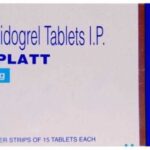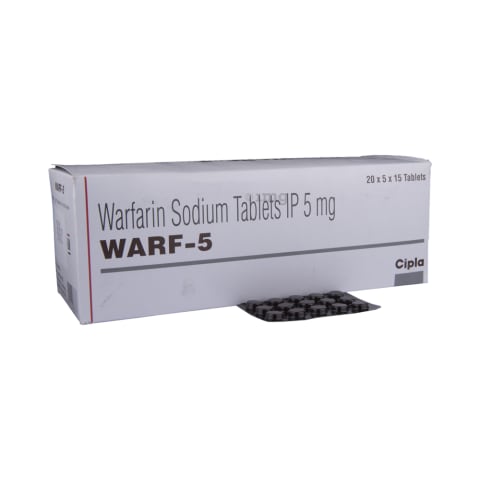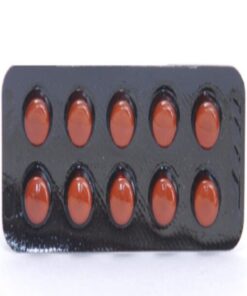Description
Warfarin, sold under the brand name Uniwarfin 2 mg among others, is a medication that prevents the formation of blood clots. It is a type of anticoagulant, also known as a blood thinner. Warfarin is used to treat and prevent blood clots in conditions such as deep vein thrombosis, pulmonary embolism, and atrial fibrillation. It is also used to prevent blood clots in people with artificial heart valves.
Warfarin works by blocking the action of vitamin K, which is essential for blood clotting. This slows down the formation of blood clots and reduces the risk of clot-related complications, such as stroke, heart attack, or pulmonary embolism.
The medication comes in various forms, including tablets and injectable solutions. The dosage and duration of treatment depend on the individual’s medical condition, age, and overall health. Regular blood tests are necessary to monitor the effectiveness of warfarin therapy and adjust the dosage accordingly.
Common side effects of warfarin include increased bleeding risk, bruising, dizziness, headache, nausea, rash, and hair loss. Precautions should be taken to minimize the risk of side effects and complications. This includes regular blood tests, informing healthcare providers of warfarin use, avoiding injury and excessive alcohol intake, and maintaining a consistent diet.
As with any medication, it is essential to follow the prescribed dosage and consult with a healthcare provider for personalized guidance on taking warfarin.
BENEFITS:
The benefits of warfarin therapy include:
- Prevention of blood clots: Warfarin is highly effective in preventing the formation of blood clots in conditions such as deep vein thrombosis, pulmonary embolism, and atrial fibrillation. This reduces the risk of serious complications, such as stroke, heart attack, or pulmonary embolism.
- Management of artificial heart valves: Warfarin is the standard treatment for preventing blood clots in people with artificial heart valves. This helps maintain the integrity of the valves and avoids complications.
- Reduced risk of clot-related complications: By preventing blood clots, warfarin therapy can lower the risk of life-threatening complications associated with clots, such as stroke, heart attack, and pulmonary embolism.
- Improved quality of life: By reducing the risk of clot-related complications, warfarin therapy can improve the overall quality of life for individuals with blood clotting disorders or artificial heart valves.
- Cost-effectiveness: Warfarin is generally an affordable medication, making it an accessible treatment option for many people.
- Proven safety and efficacy: Warfarin has been in use for several decades, and its safety and efficacy are well-established.
Overall, warfarin therapy is a crucial treatment for preventing blood clots and reducing the risk of clot-related complications. However, it is essential to follow the prescribed dosage and precautions to minimize the risk of side effects and complications.
SIDE EFFECTS:
Some of the common side effects of warfarin include:
- Increased bleeding risk: Warfarin thins the blood, which can increase the risk of bleeding. This can manifest as nosebleeds, bleeding gums, or heavier menstrual bleeding. In some cases, it can lead to more severe bleeding, such as internal bleeding or bleeding in the brain.
- Bruising: Warfarin can make the skin more sensitive to injury, leading to easy bruising.
- Nausea and vomiting: Some people may experience stomach discomfort, nausea, or vomiting while taking warfarin.
- Dizziness or lightheadedness: Warfarin can cause dizziness or lightheadedness, which may increase the risk of falls and injuries.
- Rash: Some individuals may develop a skin rash or itching while on warfarin therapy.
- Hair loss: In some cases, warfarin can cause hair loss or thinning.
- Fatigue: Warfarin therapy may cause fatigue or weakness in some individuals.
It is essential to inform your healthcare provider if you experience any side effects while taking warfarin. They may adjust the dosage or recommend additional precautions to minimize the risk of complications.
PRECAUTIONS:
To minimize the risks associated with warfarin therapy and ensure its effectiveness, it’s crucial to follow certain precautions. These include:
- Regular blood tests: Frequent blood tests are necessary to monitor the effectiveness of warfarin therapy and adjust the dosage as needed. This helps maintain the appropriate level of anticoagulation.
- Maintaining a consistent diet: Vitamin K can affect the way warfarin works, so it’s essential to maintain a consistent diet that doesn’t fluctuate in Vitamin K content.
- Inform healthcare providers about medications: Warfarin can interact with other medications, supplements, and even certain foods. It’s crucial to inform healthcare providers about all medications, supplements, and dietary changes to avoid potential drug interactions or complications.
- Wear a medical alert bracelet: In case of an emergency, a medical alert bracelet can inform healthcare providers about your warfarin therapy and help them make informed decisions about your treatment.
- Regular dental care: Good oral hygiene and regular dental check-ups are essential for individuals on warfarin therapy, as gum infections or injuries can lead to more severe bleeding.
- Exercise caution with activities: Avoid activities that may increase the risk of injury, such as contact sports or activities that may result in bruising or bleeding.
- Avoid alcohol consumption: Drinking alcohol can increase the risk of bleeding and may also interact with warfarin therapy.
- Inform healthcare providers about upcoming procedures: Certain medical procedures or surgeries may require temporary discontinuation of warfarin therapy or adjustments in dosage.
- Use caution with over-the-counter medications: Some over-the-counter medications, such as aspirin or ibuprofen, can increase the risk of bleeding. Consult with a healthcare provider before taking any new medications.
By following these precautions, individuals on warfarin therapy can minimize their risk of complications and ensure the effectiveness of their treatment.








Reviews
There are no reviews yet.